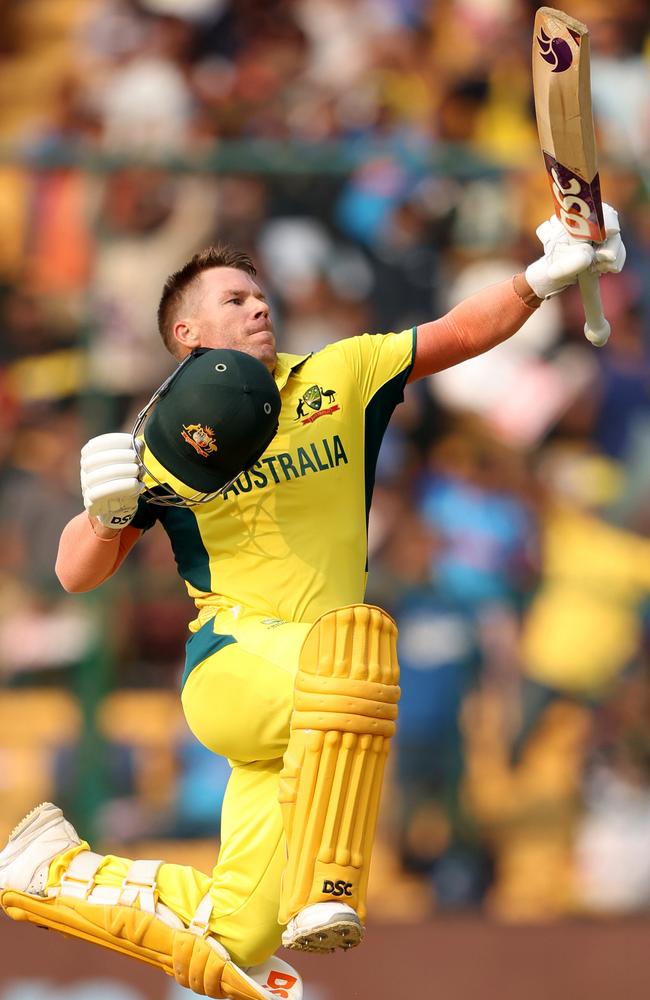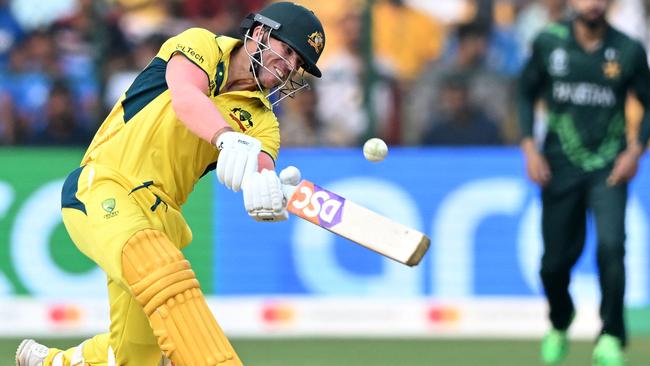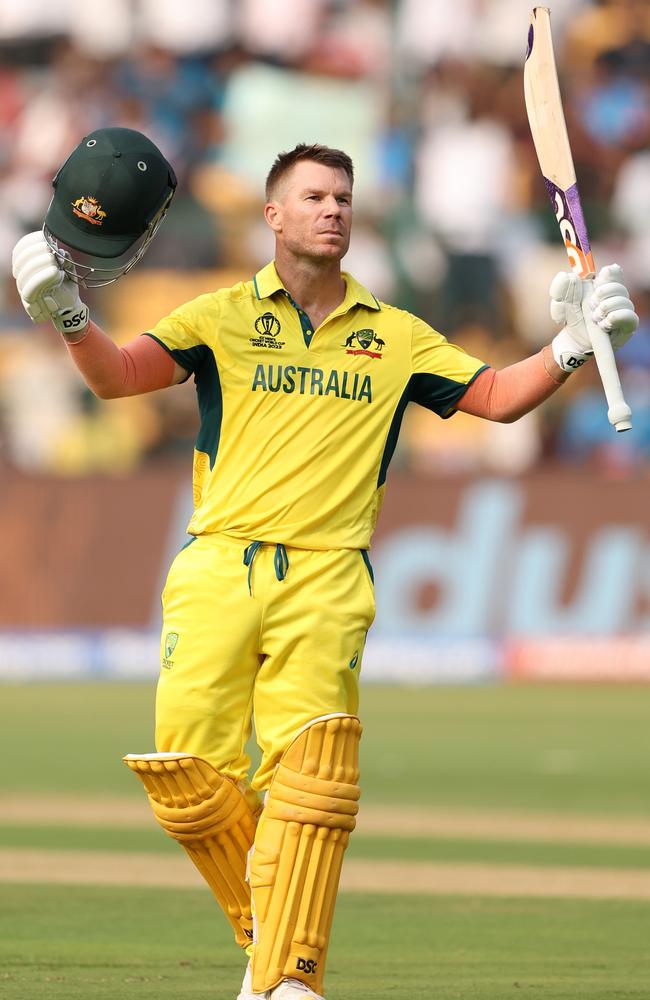Analysis: Why David Warner might be our greatest ever male ODI batsman
Australia’s tilt at a sixth world title might already be dead and buried if not for David Warner. Daniel Cherny looks at the master blaster’s case to be our greatest ever male ODI batsman.
If David Warner isn’t already Australia’s greatest ever male one-day batter, he can secure that mantle by the end of this World Cup.
That may seem sacrilege to those who grew up watching Dean Jones, Michael Bevan or Ricky Ponting, but there is a case to be made that Warner could have them all covered within a month.
Warner’s Test record has been on the decline for three years, and by his own admission he isn’t quite the powerful six-hitting force he was when he burst onto the T20 scene almost 15 years ago.
But in ODIs Warner has been able to play to his strengths, combining his long-form temperament, shrewd game awareness, outstanding fitness and deft stroke play to build a career that has him in the conversation to be the greatest ever to don the canaries.
The Aussies’ tilt at a sixth world title might already be dead and buried if not for Warner’s impact across the past two matches. Against Sri Lanka it was a pair of desperate outfield catches to stop the rot, while on Friday afternoon at the Chinnaswamy the left-hander tormented Pakistan for three hours en route to 163 off 124 balls, having been dropped on 10 and 105.

“For me, I look to try and get to 35 overs and then from there, try and put my foot down if I‘m still in. So, yeah, it‘s probably in the back of your mind, you’ve got a lot more time. And I think that‘s where in T20 cricket, I’ve learned a little bit as well to change my gears, especially in IPL I learned a lot when I was playing for Sunrisers (Hyderabad) that you‘re able to have a lot more time than you think,” Warner said after his masterpiece in Bangalore.
“And I think playing on these surfaces specifically, you know, if you give yourself time at the back end, you can actually score big. And that‘s what I felt today.”
With five World Cup centuries from 22 matches since making his debut in the tournament in 2015, Warner has shot to seventh in the tournament’s all-time list of run scorers.
Of those above him, he has a better World Cup average (61) and strike rate (100) than all bar Indian captain Rohit Sharma.
Warner is just five runs shy of Brian Lara’s tally and depending on how Sharma and Virat Kohli fare for the remainder of the event, Warner could end up behind only Sachin Tendulkar, Ponting and Kumar Sangakkara on this list.
Of Australia’s top 50 ODI run scorers, Warner’s average of 45.37 ranks third behind Michael Bevan and Mike Hussey, and his strike rate of 96.82 is the fifth best, behind Glenn Maxwell, James Faulkner, Travis Head and Adam Gilchrist.
Still, Assessing where Warner sits in the grand scheme of Australian one-day batters requires some nuance, because he is simultaneously both a beneficiary and a victim of the era in which he played.
He has played at a time of exploding strike rates across the board, shaped by shorter boundaries, more stringent fielding restrictions and the influence of Twenty20 cricket.
But it is the last of those caveats that has also contributed to one of the factors that arguably undersells Warner’s quality in the format: how little of it he has played.
Since making his debut against South Africa early in 2009, Warner has played just 154 ODIs, around 10 a year on average. There are a few reasons for this, including that Warner was in and out of the Aussie ODI side early in his career, and that he missed an entire year after being suspended for his involvement in the ball tampering scandal.
However more than anything, Warner just hasn’t had the opportunities to play anywhere near as much one-day cricket as those that came a decade or two before him.

Warner’s ODI career started in a noteworthy summer for one-day cricket in Australia in that it was the first season in almost three decades that the once flagship tri-series was not held.
Where once January nights were filled with New Zealand playing South Africa at the WACA, for the bulk of Warner’s career Cricket Australia has instead prioritised the Melbourne Renegades playing the Hobart Hurricanes under the roof at Docklands.
The pattern has been repeated around the world. When its footprint was most pronounced, one-day globetrotters would venture anywhere from New Delhi to Nairobi for some pyjama action.
These days trips from Bloemfontein to Barbados are much more likely to relate to T20, or even T10 cricket.
The upshot is that while Warner has not made even half the ODI runs Ricky Ponting scored across his career, he has also done so playing 220 fewer matches.
His excellence has come as one-day cricket has receded from the Australian sporting zeitgeist, with the exception of World Cups.
Warner is an ODI World Cup winner in 2015, a tournament in which he reached 50 just once, decimating Afghanistan with 178 at Perth.

It was the 2019 World Cup at which he made his presence felt more regularly, posting tons against Pakistan, Bangladesh and South Africa as well as half-centuries against Afghanistan and England.
All of that however was in the pool stage. He made just nine as the hosts ran through Australia’s top order in the semi-final at Edgbaston.
This is on the back of totals of 24, 12 and 45 in Australia’s three knockout matches four years earlier, matches in which Steve Smith consistently stood up (a century and two half-centuries).
Warner will not be able to match the feat of Ponting or Adam Gilchrist in winning three straight World Cups.
But having resurrected Australia’s campaign, Warner may now have the chance to play a defining innings in a sudden-death match. His answer to Steve Waugh against South Africa in the Super Six stage in 1999, Ponting against India in the 2003 final, or Gilchrist’s famous squash ball-assisted blitz against Sri Lanka to claim the 2007 crown.
If he can do that, then his status as Australia’s greatest batter in the format will be hard to contest.







To join the conversation, please log in. Don't have an account? Register
Join the conversation, you are commenting as Logout